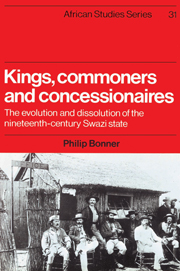 Kings, Commoners and Concessionaires
Kings, Commoners and Concessionaires Book contents
- Frontmatter
- Contents
- List of maps
- List of figures
- Preface
- Map 1 Modern Swaziland
- Map 2 Chiefdoms c. 1820
- 1 Introduction
- 2 The northern Nguni states 1700–1815
- 3 The conquest state 1820–1838
- 4 Factions and fissions: Mswati's early years
- 5 The balance tilts: Swazi–Boer relations 1852–1865
- 6 The deepening and widening of Dlamini power 1852–1865
- 7 Regency and retreat 1865–1874
- 8 Confederation, containment and conciliar rule: Mbandzeni's apprenticeship 1874–1881
- 9 The puff–adder stirs: Mbandzeni and the beginnings of concessions 1881–1886
- 10 The conquest by concessions 1886–1889
- 11 Conclusion
- Appendix
- Notes
- Bibliography
- Index
- KINGS, COMMONERS AND CONCESSIONAIRES
10 - The conquest by concessions 1886–1889
Published online by Cambridge University Press: 22 September 2009
- Frontmatter
- Contents
- List of maps
- List of figures
- Preface
- Map 1 Modern Swaziland
- Map 2 Chiefdoms c. 1820
- 1 Introduction
- 2 The northern Nguni states 1700–1815
- 3 The conquest state 1820–1838
- 4 Factions and fissions: Mswati's early years
- 5 The balance tilts: Swazi–Boer relations 1852–1865
- 6 The deepening and widening of Dlamini power 1852–1865
- 7 Regency and retreat 1865–1874
- 8 Confederation, containment and conciliar rule: Mbandzeni's apprenticeship 1874–1881
- 9 The puff–adder stirs: Mbandzeni and the beginnings of concessions 1881–1886
- 10 The conquest by concessions 1886–1889
- 11 Conclusion
- Appendix
- Notes
- Bibliography
- Index
- KINGS, COMMONERS AND CONCESSIONAIRES
Summary
By the end of 1886 pressures were building up on Mbandzeni from all sides. In Hhohho and Mahamba the S.A.R. was levying taxation on Swazi subjects in complete disregard of any protests the Swazi might make, while along Swaziland's eastern boundary the Portuguese were preparing the way for the occupation of the fertile and reputedly mineral–rich Lebombo. Again, in roughly the same twelve months, the Swazi were subjected to a concessionaire influx which dwarfed previous proportions, as the Komati and De Kaap gold–fields were opened up. New towns mushroomed on Swaziland's western borders, and these in turn spilled over into Swaziland proper as supplicants streamed into the country for mineral concessions on an unprecedented scale. To add to his troubles Mbandzeni was also confronted at about this time with the consequences of an earlier act of folly, when the sixty or so Boer families on the Ferreira and Maritz concession began agitating to be allowed to administer themselves and to be absorbed into the S.A.R. In March 1886 they took the first preliminary steps in that direction, by establishing a skeleton administration in what was now called the Little Free State, and two months later a delegation waited on Mbandzeni to acquaint him of their decision. The reception they received was evidently frosty, but they were only briefly deterred, and seven months later a new deputation was visiting Mbandzeni to tell him that the concession had been lawfully purchased by Ferreira and Maritz, and that the king could lay no further claim.
- Type
- Chapter
- Information
- Kings, Commoners and ConcessionairesThe Evolution and Dissolution of the Nineteenth-Century Swazi State, pp. 182 - 207Publisher: Cambridge University PressPrint publication year: 1983


